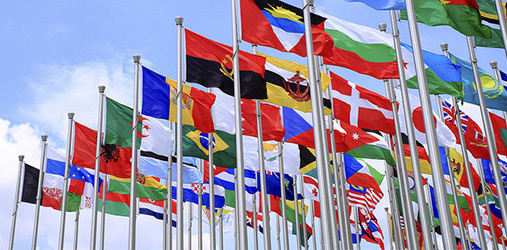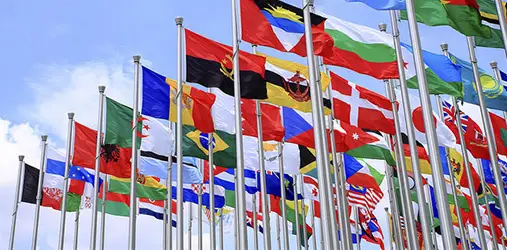By Ai Jun

Trade is about competition, collaboration, and above all, a great chance for win-win results. But nowadays US President Donald Trump is using hegemonic clauses like Section 301 and 232 to turn trade into a war, shaking the multilateral trading system through unilateralism, like a bull in a china shop.
Since the end of World War II, a wide range and large scale of global issues have emerged. Quite a few such problems were difficult if not impossible to solve through traditional channels of bilateral negotiations. This led to the rise of multilateralism and organizations such as the World Trade Organization.
The establishment of this multilateral system was essentially led by the US. But Washington is now turning into its destroyer, treating multilateralism as a threat to the US and bringing upon itself more losses than gains.
Many US laws, such as Section 301 and Section 232, are domestic trade laws adopted as emergency measures against declining US competitiveness.
In the 1970s, Japan's economy grew rapidly with its products occupying a growing number of international markets previously dominated by the US. In this context, Washington passed the Trade Act of 1974 in which Section 301 enforces US rights to addresses "unfair" foreign barriers to US exports and to retaliate unilaterally.
In other words, when the White House one-sidedly believes that its trading partners are practicing unfair trade, it can initiate investigation, make final decisions and reactions all by itself, bypassing the international community. Section 232 is much the same. It authorizes the US president to impose import restrictions on other countries in the name of US national security. Both sections deploy domestic law to deal with international affairs.
While Washington busies itself accusing others of jeopardizing the world order, it itself is becoming the greatest disruptor of the system it once established.
In his new book 21 Lessons for the 21st Century, historian Yuval Noah Harari noted that human tribes coalesced into nations as no tribe could deal with major challenges alone. Today, countries find themselves in the same situation: No power can singlehandedly resolve the constant changes the world is facing. That's why global consensus is urgently needed.
Multilateralism is one such consensus. China is firmly opposed to unilateralism through substantial practices. It is now a major driving force of global economic growth as well as a crucial player in multilateral mechanisms.
China is doing so not only to safeguard its own interests, but also to maintain the normal operation of the global trading system. In this regard, China shares interests with many other countries.
China is not alone. Multilateralism still matters to many nations. The EU and Japan reached the world's largest bilateral free trade deal on Tuesday, which shines "light in the increasing darkness," according to European Council President Donald Tusk. China and the EU are also considering forging a free-trade agreement.
In the current global trade system, there can't be a unilateral win.
(People’s Daily/Global Times)
Since the end of World War II, a wide range and large scale of global issues have emerged. Quite a few such problems were difficult if not impossible to solve through traditional channels of bilateral negotiations. This led to the rise of multilateralism and organizations such as the World Trade Organization.
The establishment of this multilateral system was essentially led by the US. But Washington is now turning into its destroyer, treating multilateralism as a threat to the US and bringing upon itself more losses than gains.
Many US laws, such as Section 301 and Section 232, are domestic trade laws adopted as emergency measures against declining US competitiveness.
In the 1970s, Japan's economy grew rapidly with its products occupying a growing number of international markets previously dominated by the US. In this context, Washington passed the Trade Act of 1974 in which Section 301 enforces US rights to addresses "unfair" foreign barriers to US exports and to retaliate unilaterally.
In other words, when the White House one-sidedly believes that its trading partners are practicing unfair trade, it can initiate investigation, make final decisions and reactions all by itself, bypassing the international community. Section 232 is much the same. It authorizes the US president to impose import restrictions on other countries in the name of US national security. Both sections deploy domestic law to deal with international affairs.
While Washington busies itself accusing others of jeopardizing the world order, it itself is becoming the greatest disruptor of the system it once established.
In his new book 21 Lessons for the 21st Century, historian Yuval Noah Harari noted that human tribes coalesced into nations as no tribe could deal with major challenges alone. Today, countries find themselves in the same situation: No power can singlehandedly resolve the constant changes the world is facing. That's why global consensus is urgently needed.
Multilateralism is one such consensus. China is firmly opposed to unilateralism through substantial practices. It is now a major driving force of global economic growth as well as a crucial player in multilateral mechanisms.
China is doing so not only to safeguard its own interests, but also to maintain the normal operation of the global trading system. In this regard, China shares interests with many other countries.
China is not alone. Multilateralism still matters to many nations. The EU and Japan reached the world's largest bilateral free trade deal on Tuesday, which shines "light in the increasing darkness," according to European Council President Donald Tusk. China and the EU are also considering forging a free-trade agreement.
In the current global trade system, there can't be a unilateral win.
(People’s Daily/Global Times)
 Menu
Menu
 Washington tramples on multilateralism with domestic laws
Washington tramples on multilateralism with domestic laws
















